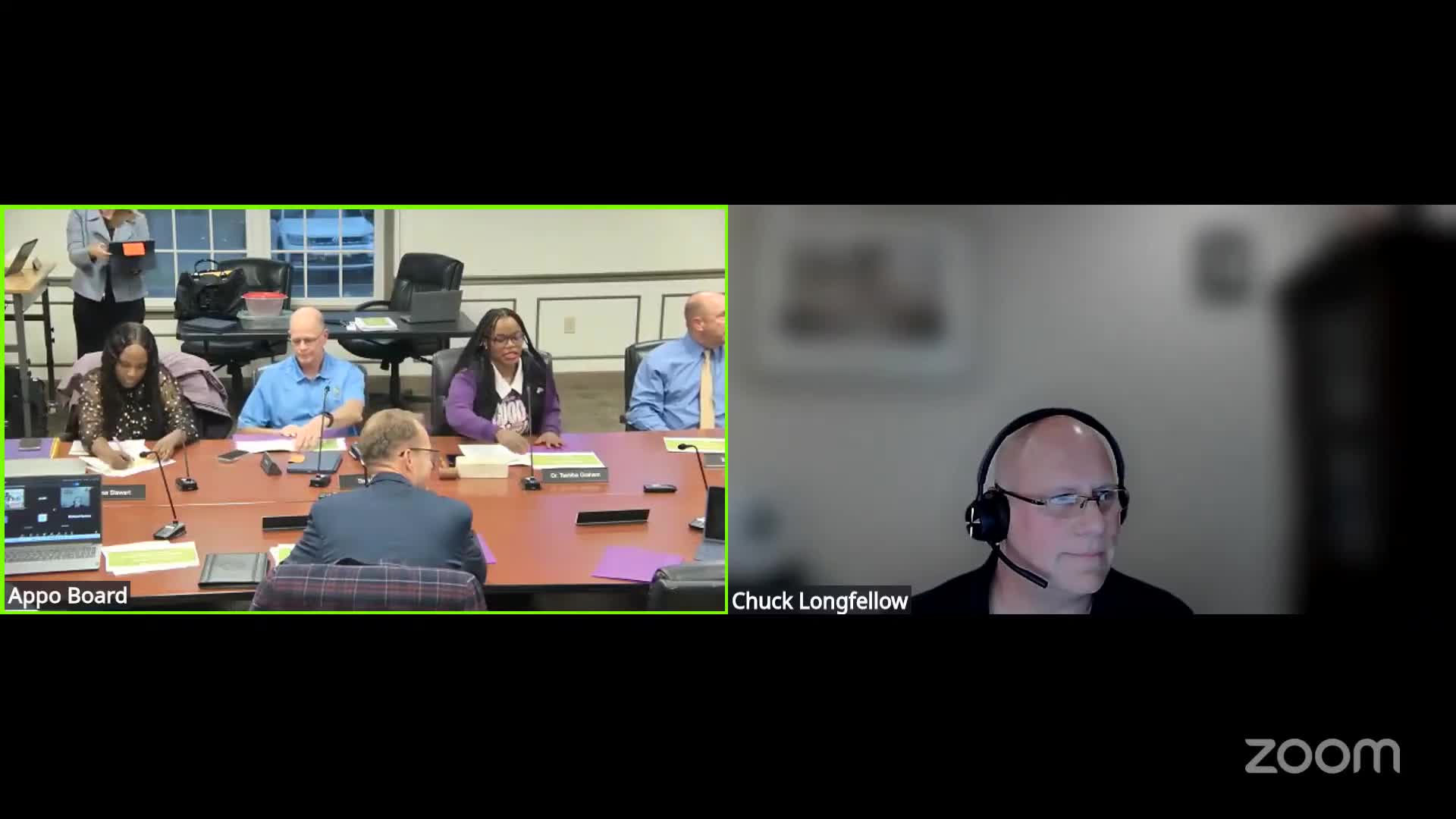Appoquinimink leaders outline steps to address state audit, tighten controls and build tuition reserve
Get AI-powered insights, summaries, and transcripts
Subscribe
Summary
At a board finance workshop, the Appoquinimink School District presented a multi-step response to a recent state audit, including new approval policies, training, software changes, $2.5 million in cuts already identified and a recommended $4.5 million tuition reserve to cover early-year payrolls.
Appoquinimink School District leaders on Thursday reviewed state audit findings and subject-matter recommendations and described steps they are taking to strengthen financial controls, improve budget transparency and build a tuition-fund reserve.
The presentation by Superintendent Dr. Burrows and Director of Finance Alisa Stewart summarized 38 pages of recommendations from the state audit and from external subject-matter experts. The district described actions already completed — including a new internal approval policy for expenditures and hiring a finance analyst — and laid out planned changes such as adopting a new budgeting system called Allaview, additional trainings, and revised reporting to the Financial Advisory Committee (FAC).
Why it matters: The audit flagged gaps that district officials said created a single point of failure in financial oversight and made regular reporting and forecasting harder. District and outside advisers cautioned that some changes depend on state systems and approvals — and they warned that tuition-driven special-education costs remain volatile, prompting a recommended tuition reserve to cover early-year payroll obligations.
District officials described concrete steps and timelines. Director of Finance Alisa Stewart said the district has implemented a policy that “all expenditures must be approved by the director of finance” and that the director meets weekly with the superintendent to review financial flows. The district also plans recurring training: finance staff and school secretaries will meet on Nov. 10 for process updates, and FAC meetings will continue monthly with minutes and supporting documents posted publicly.
External advisers led by former Appoquinimink CFO Dr. Chuck Longfellow and subject-matter expert Scott Kessel joined the workshop. Longfellow summarized the advisory approach as “show me, trust but verify,” and recommended that the board focus questions on key financial levers and program effectiveness.
On budgeting and systems, the district said its current state system (First State Financial, FSF) is a state accounting system not optimized for school budgeting. Officials said they are vetting Allaview with district IT to reduce manual spreadsheet work, automate forecasting and produce clearer revenue/expenditure reports. Stewart told the board she expects compatibility checks with IT to be completed in a few weeks and that a full rollout and timeline will follow IT vetting.
Leaders also described actions on expenditures and savings. The district reported identifying $2,500,000 in discretionary reductions earlier this year and said cabinet meetings are monitoring actualization of those cuts; one presenter said the district has already exceeded that reduction amount. Officials said they will show amended preliminary budget documents at the district’s November meeting that will separate discretionary from nondiscretionary spending and better identify state and federal funds.
Special education and tuition funds drew extended discussion. The audit noted a $1,500,000 payable to Christina School District related to FY25 services and found the tuition fund balance effectively negative going into FY26. Advisers recommended maintaining a tuition-fund carryover sufficient to cover at least seven payrolls and startup costs through October — roughly $4,500,000, according to the workshop materials. District staff said tuition-tax funds are restricted to special-education uses and are not included in the state’s “financial position” report of discretionary funds, a reporting gap the presenters flagged.
Officials also said the district has not consistently billed other districts under a Newcastle County pre-K MOU and estimated the district has left about $50,000–$60,000 per year unbilled; staff said they will work to standardize billing practices with Dr. Longfellow.
Governance and FAC role: The district plans to revise its board policies and FAC charter to clarify responsibilities, set documentation and approval signoffs, and specify the FAC representative’s reporting duties. The FAC already receives meeting materials and minutes are taken by the finance analyst; those minutes are approved by the FAC and posted on BoardDocs, officials said. The board discussed whether a board member should serve as FAC co-chair to improve reporting back to the full board.
Procurement and contract oversight came up as well. Board members urged thresholds for signatures and delegated authority to avoid bottlenecks; district staff said they will work with the superintendent to design an approach that balances oversight with operational needs.
What’s next: The director of finance said she is aiming to present a more complete budget-development timeline for FY27 in coming months — including meetings with principals and district leaders between November and February and a target of an approved preliminary expenditure budget by June 30, 2026. The district also plans to provide monthly tuition-fund balance reports to FAC, the superintendent and the board once controls are in place.
The workshop included training material from outside advisers advocating program evaluation and return-on-investment thinking for district spending. The advisers urged the board to use structured tools to rate programs on cost, number of students served and demonstrated outcomes and to consider zero-based budgeting in future cycles. The workshop closed with agreement to schedule a follow-up session to continue the training and review district feedback.
The board did not take a formal recorded vote during the workshop; staff described implementation steps and commitments and identified items that require future board policy updates or formal approvals.
